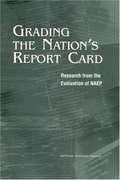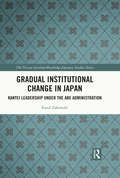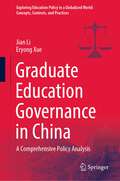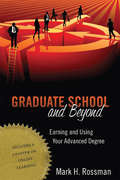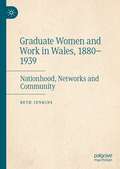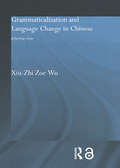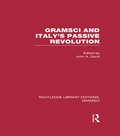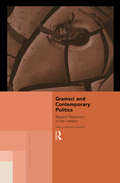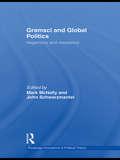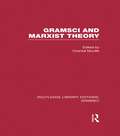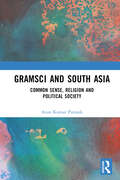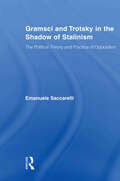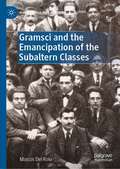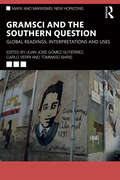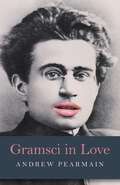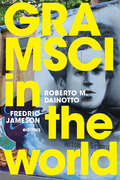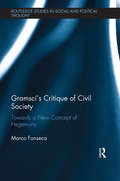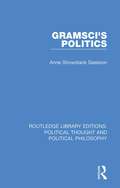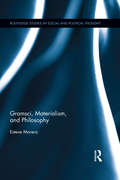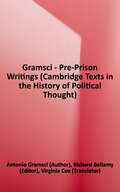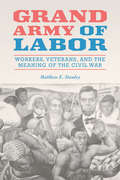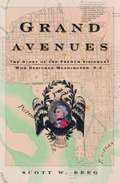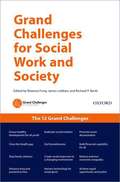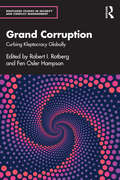- Table View
- List View
Grading the Nation's Report Card: Research from the Evaluation of NAEP
by Committee on the Evaluation of National State Assessments of Educational ProgressThe National Assessment of Educational Progress (NAEP), known as the nation's report card, has chronicled students' academic achievement in America for over a quarter of a century. It has been a valued source of information about students' performance, providing the best available trend data on the academic achievement of elementary, middle, and secondary school students in key subject areas. NAEP's prominence and the important need for stable and accurate measures of academic achievement call for evaluation of the program and an analysis of the extent to which its results are reasonable, valid, and informative to the public.This volume of papers considers the use and application of NAEP. It provides technical background to the recently published book, Grading the Nation's Report Card: Evaluating NAEP and Transforming the Assessment of Educational Progress (NRC, 1999), with papers on four key topics: NAEP's assessment development, content validity, design and use, and more broadly, the design of education indicator systems.
Gradual Institutional Change in Japan: Kantei Leadership under the Abe Administration (Nissan Institute/Routledge Japanese Studies)
by Karol ZakowskiThis book analyses institutional reforms implemented by Japanese Prime Minister Abe Shinzō, under his second administration from 2012 to 2020. Also examined is the evolution in the role of such actors in Japanese politics as bureaucrats, Liberal Democratic Party (LDP) factions, and backbenchers of the ruling party. Chapters offer multi-dimensional explanations for the preconditions of successful gradual institutional change in political systems, characterized by relatively strong veto players, rigid governmental structures, and numerous unofficial decision-making rules. It is argued that enhancement of the prime minister’s position was implemented through the creative use of pre-existing policy venues, coupled with minor institutional changes in decision-making bodies. Using three illustrated case studies, it is demonstrated how the prime minister managed to centralize the decision-making process: a result of strategic appointment of ministers, empowerment of the Cabinet Secretariat and also taking advantage of wider advisory organs, largely circumventing deliberations on key policies in the ruling party. Seemingly minor changes thus manifested in a major redefinition of decision-making patterns: a result of the long-term perspective of the Abe administration. Gradual Institutional Change in Japan: Kantei Leadership under the Abe Administration will be useful for students seeking to understand the process of successful gradual institutional change and for scholars of Japanese studies and political science.
Graduate Education Governance in China: A Comprehensive Policy Analysis (Exploring Education Policy in a Globalized World: Concepts, Contexts, and Practices)
by Jian Li Eryong XueThis book explores graduate education governance in China from a comprehensive policy perspective. It offers conceptual and practical models to systematically analyze the holistic landscape of graduate education governance in China. In particular, it analyzes the national governance of graduate education in China, graduate education quality assurance in China, the student-tutor relationship of graduate education in China, the regional layout structure of graduate education in Chinese universities, the integration of science and education in China’s graduate education, the integration of industry and education in graduate education, the reform of graduate education evaluation system and mechanism in China’s universities, the opening up of graduate education in China’s universities, an international comparison of graduate education governance policies between the case of China and the USA.
Graduate School and Beyond: Earning and Using Your Advanced Degree
by Mark H. RossmanKnowledge is power. Simply stated, this book provides graduate students-traditional and returning learners-with power. To succeed, graduate students need to understand the process of completing a graduate degree, control as many aspects of the process as possible, and be careful, skillful, and tactful negotiators. This book gives prospective graduate students a preview of what to expect and equips current graduate students with what they need to know to maneuver an often labyrinthine system. Online courses, distance learning, social networking, and the effects of the internet on graduate education are special features of this book emerging from the author's 35 years of experience in leading edge educational settings.
Graduate Women and Work in Wales, 1880–1939: Nationhood, Networks and Community
by Beth JenkinsThis book traces the social backgrounds, educational experiences and subsequent lives of women who attended the university colleges in Wales from their inception to the outbreak of the Second World War. Using a sample of 2,000 graduates, the book foregrounds the experience of working-class women and critically assesses the claim of social inclusivity built around education in Wales. It charts changes and continuities in women’s career prospects; explores graduates’ relationship with the communities in which they studied, lived, and worked; and, finally, examines the extensive networks which underpinned their personal and professional lives.
Grammaticalization and Language Change in Chinese: A formal view (Routledge Studies in Asian Linguistics)
by Xiu-Zhi Zoe WuThis innovative study on the phenomenon of 'grammaticalization' and its manifestation in Chinese provides new insights into language change in Chinese and a large number of grammatical topics. Grammaticalization occurs in all of the world's languages. Xiu-Zhi Zoe Wu demonstrates general linguistic principles present and active in the phenomenon of grammaticalization whilst also describing the modelling of language in formal theoretical approaches to syntax; so this book fills two major gaps in the current study of linguistics. Grammaticalization and Language Change in Chinese illuminates how studies of language development and change provide special insights into the understanding of current, synchronic systems of language. Using patters from Chinese, the author establishes cross-linguistic generalizations about language change and grammaticalization. This book should be of great interest to Chinese linguists and readers interested in language change in different languages.
Gramsci (RLE (RLE (RLE (RLE (RLE (RLE (RLE (RLE: Gramsci): And Italy's Passive Revolution
by John A. DavisAntonio Gramsci used the term ‘passive revolution’ to describe the limitations and weaknesses of the 19th century bourgeois state in Italy which permitted economic development whilst thwarting social and political progress. This detailed study consists of seven essays each exploring a different theme of the economic and social basis of the Liberal state, providing a broad understanding of the background against the emergence of Italian fascism and present a number of debates and controversies amongst Italian historians. By critical discussion of Gramsci’s reading of modern Italian history, the essays present an analysis of the structure and development of social and economic relations in the formation of the Liberal state, illustrating the transition from liberalism to fascism.
Gramsci and Contemporary Politics: Beyond Pessimism of the Intellect (Routledge Innovations in Political Theory)
by Anne Showstack SassoonCan politics now be both radical and realistic? Gramsci and Contemporary Politics is a collection of Anne Showstack Sassoon's writing which spans the major transitions from Thatcher and Reagan to Clinton and Blair; the collapse of communism to the regeneration of social democracy. Applying original interpretations of Antonio Gramsci's ideas on the intellectuals, political language, civil society and political leadership, she argues that drawing from the past, and broadening contemporary sources of political and academic knowledge can contribute to a grounded, radical hegemonic politics which can bring about change.
Gramsci and Global Politics: Hegemony and resistance (Routledge Innovations in Political Theory)
by John Schwarzmantel Mark McNallyThe aim of this book is to explain and assess the relevance of the ideas of Gramsci to a world fundamentally transformed from that in which his thought was developed. It takes some of Gramsci’s best-known concepts – hegemony, civil society, passive revolution, the national-popular, trasformismo, the integral state - and uses them creatively to analyse features of present-day politics, assessing to what extent his ideas can aid our understanding of the contemporary political world. The book contains essays focused on: aspects of global politics (the development of a global civil society, the validity of the knowledge claims of neo-Gramscian IR specialists and the politics of the WTO and the Alternative Globalisation Movement); contemporary feminism; the problem of adjusting Gramsci’s theory of political agency to modern conditions; Turkish and Israeli politics; and a series of essays on present-day British politics. The book concludes that while there remain considerable problems in applying Gramsci’s concepts to the contemporary world, his political thought still retains an attraction and validity that will continue to inspire political analysts well into the future. Bringing together a range of essays representing some of the latest research in the field, Gramsci and Global Politics: Hegemony and Resistance opens up new perspectives on Gramsci which will be of vital interest to students and scholars in International Relations and Political Science, Sociology and History.
Gramsci and Marxist Theory (RLE: Gramsci)
by Chantal MouffeThis book familiarizes the English-speaking reader with the debate on the originality of Gramsci’s thought and its importance for the development of Marxist theory. The contributors present the principal viewpoints regarding Gramsci’s theoretical contribution to Marxism, focussing in particular on his advances in the study of the superstructures, and discussing his relation to Marx and Lenin and his influence in Eurocommunism. Different interpretations are put forward concerning the elucidation of Gramsci’s key concepts, namely: hegemony, integral state, war of position and passive revolution.
Gramsci and South Asia: Common Sense, Religion and Political Society
by Arun Kumar PatnaikGramsci’s theory of common sense is a metanarrative that can be used to explain both religion and political formations. This book examines Gramsci’s perspective and how his theories translate into South Asian society. It explores Gramsci’s historicism, which is sensitive to historical, regional and national differences, and its relevance in post-colonial societies.The volume discusses themes like common sense, religious common sense, folk religion, dialogue and common sense concerning civil/political society through the lens of Gramsci’s historical perspectives. It also looks at Gramscian critique of political secularism, the ideology and politics of Hindutva, civil society in a non-Western context and modes of political society in India.Lucid and topical, this book is a must-read for scholars and researchers of political studies, political philosophy, post-colonial studies, South Asian politics, cultural studies and political sociology.
Gramsci and Trotsky in the Shadow of Stalinism: The Political Theory and Practice of Opposition
by Emanuele SaccarelliThis book examines the legacy of Antonio Gramsci and Leon Trotsky in the shadow of Stalinism in order to reassess the very different and distorted academic reception of the two figures, as well as to contribute to the revitalization of Marxism for our time. While Gramsci and Trotsky lived and died in a similar fashion, as revolutionary Marxist leaders and theoreticians, their reception in academia could not be more different. Gramsci has become tremendously popular, becoming a central figure in many disciplines, while Trotsky remains largely ignored. Saccarelli argues that not only is Gramsci popular for the wrong reasons--being routinely distorted and depoliticized--even when rescued from his contemporary users, Gramsci remains inadequate. Conversely, the fact that Trotsky remains beyond the pale of "theory" is a terrible indictment of the current state of academic thinking.
Gramsci and the Emancipation of the Subaltern Classes (Marx, Engels, and Marxisms)
by Marcos Del RoioThis book outlines essential issues of Antonio Gramsci’s thought, from his relationship to other political thinkers, including Rosa Luxemburg, Lenin, and Machiavelli; the development of his key conceptual categories; and the applicability of those categories in contemporary contexts. The author demonstrates how Gramsci’s revolutionary strategy begins with the knowledge of the subaltern classes’ common sense, and their elements of rebellion, in order to establish a dialectical relationship between intellectuals and the masses. That relationship promotes collective intellectual progress, ultimately leading to an effective philosophy of praxis, founded on labor and a new hegemony. The book demonstrates that Gramsci’s thought offers possibilities for understanding the serious crises of today.
Gramsci and the Southern Question: Global Readings, Interpretations and Uses (Marx and Marxisms)
by Juan José Gómez Gutiérrez, Carlo Verri and Tommaso BarisThis book looks at the Southern question in Antonio Gramsci. It takes this as an opportunity to reflect on the special nature of his thought, linked to the concepts of hegemony, subalternity and the critique of the particular culturalidentitarian and ideological forms of the South and its historical development.Although the category was originally applied to the politics and history of Italy, the debates on the Southern question have in recent times gained wider relevance, combining with today’s more general analyses relating, for example, to European geopolitics, globalisation and the various global Souths, to media and mass culture, etc. In other areas, the Southern question in Gramsci has taken the form of a materialist epistemology, connected to the historical phenomenon of the splitting of consciousness, as opposed to its unity on a theoretical level. Elsewhere, it has become a programme for the application of a strategy of the international left, based on the building of alliances between different groups of subalterns. Over time, Gramsci's thought has come into contact with other partly converging perspectives, such as critical urban theory and cultural and subaltern studies.This has given rise to numerous fruitful lines of research in which the Southern question has been extended from Italy’s own North-South divide to other contexts. What aspect of Gramsci’s thought could justify this issue taking on such importance? Gramsci and the Southern Question: Global Readings, Interpretations and Uses aims to answer this question by combining general theoretical approaches with studies on the reception of Gramscian concepts in the world’s Souths.
Gramsci in Love
by Andrew PearmainGramsci in Love is a fictional account of the love life of the famous Italian communist leader Antonio Gramsci (1891-1937), focusing on his curious relationships with the three Schucht sisters, Evgenia, Tatiana and his wife Julia. It is set against the background of the Soviet Revolution and the Fascist takeover in Italy.
Gramsci in the World
by Roberto Dainotto and Fredric JamesonAntonio Gramsci's Prison Notebooks have offered concepts, categories, and political solutions that have been applied in a variety of social and political contexts, from postwar Italy to the insurgencies of the Arab Spring. The contributors to Gramsci in the World examine the diverse receptions and uses of Gramscian thought, highlighting its possibilities and limits for understanding and changing the world. Among other topics, they explore Gramsci's importance to Caribbean anticolonial thinkers like Stuart Hall, his presence in decolonial indigenous movements in the Andes, and his relevance to understanding the Chinese Left. The contributors consider why Gramsci has had relatively little impact in the United States while also showing how he was a major force in pushing Marxism beyond Europe—especially into the Arab world and other regions of the Global South. Rather than taking one interpretive position on Gramsci, the contributors demonstrate the ongoing relevance of his ideas to revolutionary theory and praxis.Contributors. Alberto Burgio, Cesare Casarino, Maria Elisa Cevasco, Kate Crehan, Roberto M. Dainotto, Michael Denning, Harry Harootunian, Fredric Jameson, R. A. Judy, Patrizia Manduchi, Andrea Scapolo, Peter D. Thomas, Catherine Walsh, Pu Wang, Cosimo Zene
Gramsci's Critique of Civil Society: Towards a New Concept of Hegemony (Routledge Studies in Social and Political Thought)
by Marco FonsecaAntonio Gramsci was an Italian Marxist thinker whose radical ideas on how to build an alternative world from below remain vigorously relevant today. Gramsci’s philosophy of praxis critically dissects the institutions of modern liberal democracy to reveal what is perhaps its deepest secret: it is the most successful political system in modernity at preserving an objective condition of domination while transforming it into a subjective conviction of freedom. Based on a careful reading of Gramsci's The Prison Notebooks, Marco Fonseca shows hegemony as more than leadership of elites over subaltern majorities based on "consent". Following Gramsci’s critique of citizenship, civil society and democracy, including the current project of neoliberal "democracy promotion" particularly in the Global South, he discloses a hidden process of hegemony that generates the preconditions for consent and, thus, successful domination. As the struggles from Zapatismo to Chavismo and from the Arab Springs to Spain’s Podemos show, liberation is not possible without counter-hegemony. This book will be of interest to activist scholars engaged in the study of Marxism, Gramsci, political philosophy, and contemporary debates about the renewal of Marxist thought and the relevance of revolution and Communism for the twenty-first century.
Gramsci's Politics (Routledge Library Editions: Political Thought and Political Philosophy #51)
by Anne Showstack SassoonFirst published in 1980. This book analyses Gramsci’s political theory and the consequences of his ideas for the theory of the state and of the political party. Using the new tools of analysis which have been developed in Italy the book presents Gramsci’s political theory as part of the attempt to develop further a Marxist theory of politics. The book also serves as a basis for considering the theoretical foundations of political developments such as Eurocommunism and the author argues that Gramsci’s political thought provides useful instruments for both a critique of Stalinism and of social democracy and offers a grounding for conceptualising democratic forms of socialism which did not simply reinforce the State. This title will be of interest to students of politics, philosophy, and history.
Gramsci, Materialism, and Philosophy (Routledge Studies in Social and Political Thought)
by Esteve MoreraWestern critical theory, Marxism included, has largely been based on a view of historical materialism that Gramsci, among others, developed in his prison notebooks. For many, Gramsci’s philosophical reflections in prison offered a new foundation for the philosophy of the future. His reflections on the philosophy of praxis and absolute historicism find echoes in much of what today is considered to be a materialist philosophy. That form of materialism was unable to provide a sound foundation for a progressive social project, the possibility of a meaningful and creative ethical life, and the forms of activity or praxis that would be conducive to creating good society. In this book, Esteve Morera connects Marxist philosophy to the broader philosophical discussion of materialism in metaphysics, the philosophy science, philosophy of mind, and naturalised ethics. Each chapter deals with a particular aspect related to materialism and its consequences, the sorts of things that, if materialism is true, need to be confronted. Morera critiques, and rejects Gramsci’s conception of matter and materialism and concludes that that philosophical materialism is compatible with freedom, and as a consequence, offers a good foundation for ethical life. Gramsci, Materialism, and Philosophy is an original contribution to the philosophically vital debates around the meaning, limitations, implications, and possibilities of philosophical materialism as it is a contribution to the critical literature on Gramsci.
Gramsci, Political Economy, and International Relations Theory: Modern Princes and Naked Emperors
by Alison J. AyersThis book seeks to provide the most comprehensive and sustained engagement and critique of neo-Gramscian analyses available in the literature. In examining neo-Gramscian analyses in IR/IPE, the book engages with two fundamental concerns in international relations: (i) The question of historicity and (ii) The analysis of radical transformation.
Gramsci: Pre-Prison Writings (Cambridge Texts in the History of Political Thought)
by Antonio GramsciThis collection of Gramsci's pre-prison writings, newly translated and including several pieces not previously available in English, encompasses the full range of his journalistic activity, from general cultural criticism to commentaries on local, national, and international events. It will be of interest to a broad range of scholars and students concerned with the history of political, social, and cultural thought in the twentieth century.
Grand Army of Labor: Workers, Veterans, and the Meaning of the Civil War (Working Class in American History #1)
by Matthew E. StanleyEnlisting memory in a new fight for freedom From the Gilded Age through the Progressive era, labor movements reinterpreted Abraham Lincoln as a liberator of working people while workers equated activism with their own service fighting for freedom during the war. Matthew E. Stanley explores the wide-ranging meanings and diverse imagery used by Civil War veterans within the sprawling radical politics of the time. As he shows, a rich world of rituals, songs, speeches, and newspapers emerged among the many strains of working class cultural politics within the labor movement. Yet tensions arose even among allies. Some people rooted Civil War commemoration in nationalism and reform, and in time, these conservative currents marginalized radical workers who tied their remembering to revolution, internationalism, and socialism. An original consideration of meaning and memory, Grand Army of Labor reveals the complex ways workers drew on themes of emancipation and equality in the long battle for workers’ rights.
Grand Avenue:The Story of the French Visionary Who Designed Washington DC
by Scott W. BergGrand Avenues tells the riveting story of Pierre Charles L'Enfant and the creation of Washington, D.C. from the seeds of his inspiration to the fulfillment of his extraordinary vision. L'Enfant's story is one of consuming passion, high emotion, artistic genius, and human frailty. As a boy he studied drawing at the most prestigious art academy in the world. As a young man he left his home in Paris to volunteer in the army of the American colonies, where he served under George Washington. There he would also meet many of the people who would have a profound impact on his life, including Alexander Hamilton and James Monroe. And it was Washington himself who, in 1791, entrusted L'Enfant with the planning of the nation's capital and reluctantly allowed him to be dismissed from the project eleven months later. The plan for the city was published under another name, and for the remainder of his life L'Enfant fought for recognition of his achievement. But he would not live to see that day, and a century would pass before L'Enfant would be given credit for his brilliant design. Scott W. Berg recounts this tale, richly evocative of time and place, with the narrative verve of a novel and a cast of characters that ranges from Thomas Jefferson and the other Founding Fathers to the surveyor who took credit for L'Enfant's plans, the assistant who spent a week in jail for his loyalty to L'Enfant, and the men who finally restored L'Enfant's reputation at the beginning of the twentieth century. Here is a fascinating, little-explored episode in American history: the story of a visionary artist and of the founding of the magnificent city that is his enduring legacy.
Grand Challenges for Social Work and Society
by Rowena Fong Richard P. Barth James LubbenThe Grand Challenges for Social Work Initiative (GCSWI), which is spearheaded by the American Academy of Social Work and Social Welfare (AASWSW), represents a major endeavor for the entire field of social work. GCSWI calls for bold innovation and collective action powered by proven and evolving scientific interventions to address critical social issues facing society. The purpose of GCSWI was modeled after the National Academy of Engineering, which aimed to identify some of the most persistent engineering problems of the day and then put the attentions, energies, and funding of the entire field to work on them for a decade. The GCSWI does the same for social issues, tackling problems such as homelessness, social isolation, mass incarceration, family violence, and economic inequality. Grand Challenges for Social Work and Society is an edited book that will present the foundations of the GCSWI, laying out the start of the initiative and providing summaries of each of the twelve challenges. The 12 main chapters that form the core of the book, one on each of the dozen Grand Challenges, are written by the primary research teams who are driving each GC project.
Grand Corruption: Curbing Kleptocracy Globally (Routledge Studies in Security and Conflict Management)
by Robert I. Rotberg Fen Osler HampsonThis book examines the nature, causes, and consequences of grand corruption, showing how it can be assessed, measured, and attacked from within and without.The volume brings together in a single, definitive text some of the best analyses on how to measure the costs of grand corruption and dissects the legal approaches and institutions to counter grand corruption and kleptocracy. Through a series of compelling country case studies, the book explores how corrupt political elites and public officials have stolen from the public purse for personal gain at the expense of their own people and their country’s social and economic development. It also highlights the role of financial and legal intermediaries in the West in laundering these ill-gotten gains. The volume then explores the impact of existing legal constraints on controlling corruption, some of which are still in the evolutionary stage of development. It draws lessons from different national attempts to control corruption as well as regional and international initiatives. The final section of the volume discusses a variety of new anti-corruption initiatives, including efforts to establish an International Anti-Corruption Court.This book will be of much interest to students of grand corruption, global governance, foreign policy, international law, and international relations.
